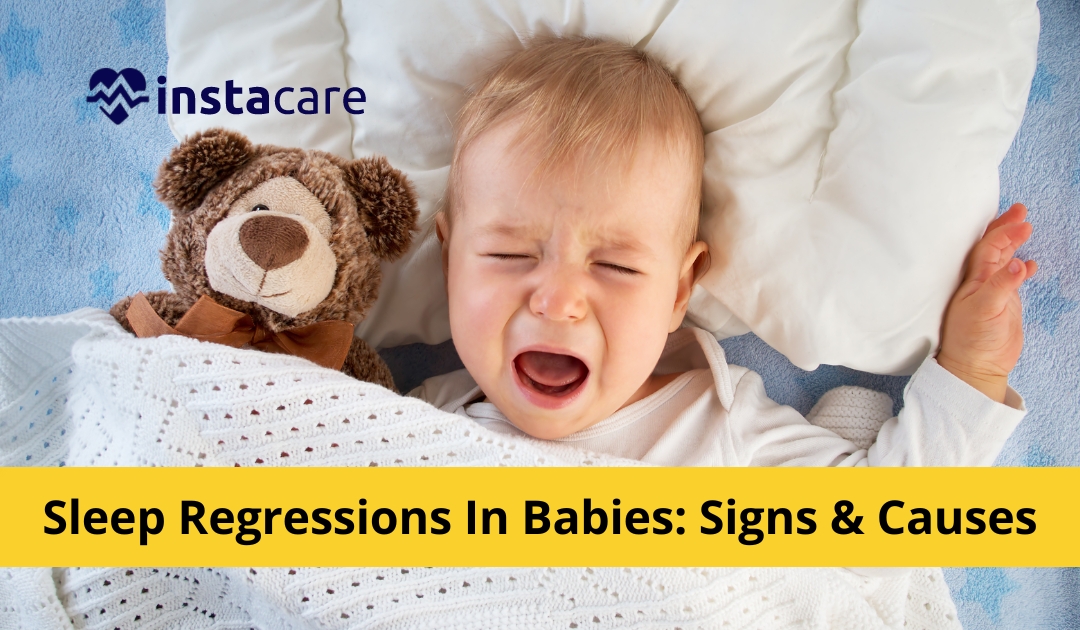Sometimes, we may experience difficulty in getting quality sleep – particularly if our little one is going through a period of sleep regression. Sleep regression can be an incredibly difficult time for parents, who often feel helpless as their kiddo cries all night long or wakes up every hour.
If you’ve been struggling with your child’s sleeping habits recently, then it’s likely that you're experiencing a period of sleep regression. So, what exactly is it? In this blog post, we will talk about the signs and symptoms of sleep regression and explain how to address the problem so you can reclaim those glorious nights of deep slumber!
What is sleep regression?
Sleep regressions involve a temporary sleep pattern change, causing you or your little one to struggle sleeping at night and take longer naps in the day. This usually occurs around 4 months of age, but sleep regression can also happen in older children. During sleep regressions, babies may wake up more often at night and fight sleep during naptime.
Thanks to sleep regressions, sleep deprivation may become a common problem in households with young kids - especially if the sleep regression isn't managed properly! Fortunately, it's just a stage they (and you!) need to pass through and by getting informed & recognizing triggers that create sleep disturbances, parents can get their child's sleep back on track.
Causes of sleep regression in babies and what are the reasons?
Sleep regression in babies occurs when a child suddenly begins to sleep less and struggle more with sleep than what was previously normal. It is thought that this regression is caused by developmental leaps, such as increased cognitive awareness or physical activity.
Babies may also experience sleep regressions due to sleep disruptions like shifting nap times, teething pain, illnesses, sleep environment changes, or simply adjusting to different sleep schedules. Luckily, sleep regressions tend to be temporary and with appropriate sleep training and lots of patience from the parent can be managed without much difficulty.
View More: Children Eye Health And Safety Month
How long does sleep regression last?
Sleep regressions can be a trying time for sleep-deprived parents, especially when their baby is going through sleep regression. The good news is sleep regressions are temporary and typically last two to four weeks; however, some babies may suffer from sleep regressions until they're 18 months old. Although sleep regressions vary in length, all sleep regressions follow the same pattern:
They start abruptly, last between two and four weeks, and end suddenly. It is important for parents to remember sleep regressed babies usually don't need any medical intervention—they just need extra love and patience through this tough time.
What are the stages of sleep regression?
Sleep regressions are natural periods of sleep disruption that occur in babies and toddlers as they develop. Each sleep regression refers to different age ranges and can vary in severity. Generally, sleep regressions happen at 4 months, 8 months, 12 months, 18 months and at 2 or 3 years old.
During sleep regressions, your baby can experience disrupted sleep patterns or a sudden increase or decrease in sleep duration. At this time it's important to be patient with your baby as they may take some time to adjust back to their normal sleep routine. Managing your expectations during sleep regressions is key in allowing your baby the chance to find their own way to restful sleep again.
Sleep regression stage by stage
4- month sleep regression
Every baby is different, but sleep regressions are a common experience for 4-month olds. These sleep regressions can be hard on parents as babies often exhibit sleep patterns that are drastically different from what parents have grown accustomed to.
During sleep regression at this age, a baby may sleep significantly less, wake up more frequently during the night, and may become more difficult to consol. While frustrating, it is important to remember that sleep regressions are temporary and will pass in time. If you're worried about your baby's sleep patterns it's always best to reach out to a pediatrician for their expertise.
View More: Various Nose Bleeding Reasons And How To Stop It
6- month sleep regression
Sleep regressions in babies can be a frustrating experience for both the little ones and their sleep-deprived parents. A 6-month sleep regression is a period of increased sleep disturbances occurring around the time that babies are 6 months old.
Common issues include increased wakefulness, changes in sleep schedule, or difficulty falling asleep or staying asleep.
Fortunately, this sleep regression generally only lasts between 2 to 8 weeks. It is important to remember that sleep regressions are developmentally normal and most children outgrow sleep regressions with a consistent bedtime routine and positive sleep environment.
8- month sleep regression
Sleep regressions can be a difficult time for parents. While it’s completely normal for sleep regression to begin around 8 months old, this is a difficult stage for babies as their sleep patterns change and become less predictable.
During sleep regressions, babies may wake more frequently throughout the night or take longer sleep stretches, making it hard for parents to get restful sleep. With patience and understanding, sleep regression in babies can be managed with the right sleep routine in place that establishes healthy sleep habits in both parents and baby alike.
12- month sleep regression
Sleep regressions can be hard times for parents and caregivers, and especially so when they hit in the 12th month. Contrary to what many think, sleep regression in babies is a normal part of childhood development. As babies become toddlers and their language skills, mobility and independence increase significantly, sleep patterns can often take a turn for the worse.
Without proper sleep and routine, parents may find themselves in an exhausting sleep deprivation cycle that can be difficult to break. To combat sleep regression at this time of life, it is important to focus on creating sleep associations, establishing routines and following through with consistency which can help settle any sleep disturbances caused by sleep regression.
18- month sleep regression
Sleep regressions are a natural part of sleep development in babies, and the 18-month sleep regression is quite common. It usually begins around 16 months and lasts until around 24 months of age. During sleep regression, sleep patterns become more irregular - this means frequent night wakings, shorter naps, and longer periods spent trying to fall asleep at night.
For parents and caregivers it can be incredibly frustrating but it is important to remember that these regressions will pass, the sleep schedule will regulate again on its own, and your baby will sleep better soon.
Conclusion
All in all, it's important to remember that sleep regressions are a natural part of a baby’s development, so don't panic when you see any of the signs start to show up in your little one. Yes, they can be difficult to deal with right now, but this is just a phase and will eventually pass. Follow the tips above and hang in there while your little one passes through each sleep regression stage unharmed. When one phase ends you can work with your little one on transitioning them into healthy and more beneficial sleep habits for the future when the next sleep regression comes around.
Teaching your baby good sleep patterns now sets them up for continually healthier sleeping habits as they grow. So, take deep breaths and keep going - even during these tough times - remembering that this too shall pass. Sleep regressions are a normal factor of infant development; make sure you learn the signs, causes and ages so that you'll be prepared to handle them down the road!
If you want to consult with the best pediatrician in Pakistan, book an appointment through InstaCare or you can call helpline number 0317-1777509 for assistance to find the right professional for your concerns.
Source: https://instacare.pk/blog/sleep-regressions-in-babies











